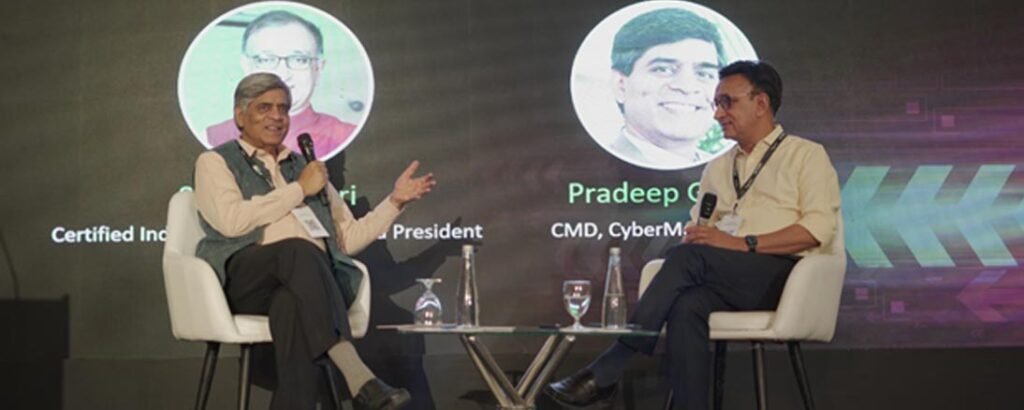A dynamic fireside chat between Pradeep Gupta, CMD of CMR, and Srikant Sastri, Certified Independent Director and President of TiE-Delhi/NCR, illuminated the transformative potential of AI at the Xcelerate 2024 conference in Delhi organized by Schneider Electric and CMR. The discussion delved deep into the technology’s implications for businesses, particularly SMEs, and the broader economic landscape.

Srikant Sastri, drawing from the exhilarating experience of the Ventilator Project during the COVID-19 pandemic, emphasised the power of collaboration and rapid innovation. The project, which saw a ventilator developed in a record 90 days, showcased the potential of Indian talent and SMEs when united by a common goal. “When 20 Indian talents come together and make up their minds, you can actually do it in 90 days even when the world is locked down actually,” Sastri remarked, underscoring the nation’s capacity for rapid innovation.
Pradeep Gupta echoed this sentiment, highlighting the pivotal role of SMEs in driving economic growth. He emphasized the transformative potential of technology, particularly AI, in empowering SMEs to compete globally. “There are a lot of things that you can get for free today. And let me give an example. Because I’m involved with many startup incubators and accelerators in the country, one of the things I see, is that obviously we have 1 lakh plus talented startups in the country,” Gupta stated, emphasising the opportunities for SMEs to leverage cutting-edge technologies.
The conversation delved into the practical applications of AI, with a particular focus on marketing. Sastri illustrated how AI-powered tools can revolutionize marketing strategies, enabling personalized customer engagement, content creation, and social media management. “Personalized marketing videos, that’s the second example that I can give you. Similarly, if you have let’s say product brochures, stuff like that, I mean you can just put them together in an AI engine and you can create chatbots around that,” he explained.
The speakers also addressed the evolving landscape of data centres and the opportunities for SMEs. While acknowledging the dominance of large-scale data centre providers, they identified niche areas where SMEs could excel, such as specialized data centres catering to specific industries or regions.
A significant portion of the discussion was dedicated to the challenges faced by SMEs in adopting AI technologies. The high cost of implementation and the lack of in-house expertise were identified as major hurdles. However, both Gupta and Sastri emphasized the availability of resources, such as online courses, mentorship programs, and cloud-based solutions, to address these challenges.
To illustrate the potential of AI, Sastri shared insights from his role as the chair of a government committee on geospatial data. He explained how the liberalization of this sector has opened up vast opportunities for SMEs to develop innovative location-based services. “If you want to create a messaging to your customers, you know, you can create it very, very easily, whatever is the kind of messaging that has to go,” he said, emphasizing the power of AI in content creation.
The fireside chat concluded with a call to action for SMEs to embrace technology and innovation. Both Gupta and Sastri expressed optimism about the future, emphasizing the potential of AI to drive economic growth and create new business opportunities. As Gupta noted, “The list is literally endless.”
Key takeaways from the discussion include:
- The critical role of collaboration and innovation in driving business success.
- The transformative potential of AI for SMEs, particularly in marketing, customer engagement, and data-driven decision-making.
- The importance of addressing the challenges faced by SMEs in AI adoption, such as cost and skill gaps.
- The opportunities presented by emerging technologies like geospatial data and cloud computing.
By fostering a dialogue between industry leaders and the SME community, the fireside chat provided valuable insights and inspiration for businesses seeking to navigate the complexities of the digital age.
To gain a deeper understanding of the implications of generative AI, further exploration is needed in several areas. These include the role of generative AI in specific industries (e.g., healthcare, finance, education), the impact of generative AI on job markets and workforce skills, the ethical implications of AI-generated content and deepfakes, and the potential for AI to exacerbate existing inequalities.
Watch the full session here: https://youtu.be/8O1CqrsunpA









